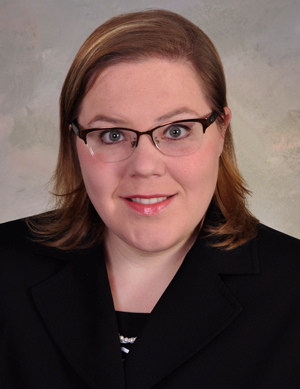About Geisinger
Danville, Pennsylvania-based Geisinger serves more than 3 million residents throughout 45 counties in central, south-central and northeastern Pennsylvania and in southern New Jersey. The physician-led system is comprised of approximately 30,000 employees, including 1,600 employed physicians, and comprises 13 hospital campuses and two research centers.
Kate Polczynski
Associate vice president, procurement
Geisinger
Danville, Pennsylvania
Born and raised in Danville, Pennsylvania, Kate Polczynski received a bachelor’s degree from the University of Pittsburgh at Johnstown and a master’s of business administration from Shippensburg University. She also has a Certificate of Achievement in Lean Six Sigma Black Belt from Villanova University, and is a Certified Materials and Resource Professional as administered by the American Hospital Association. Additionally, she has served as an adjunct professor at Bloomsburg University of Pennsylvania, Zeigler College of Business.
“While in college, the ‘Supply Chain’ classes focused on logistics, and ‘Contracting’ classes were for those moving toward a legal profession,” she says. “But once I was exposed by my mentors to the strategy, data and negotiation elements of healthcare contracting, I was hooked. I have always had a passion to contribute to the healthcare industry, and found that while working in Procurement I could utilize my business skills, while having the ability to impact a patient’s journey.”
She joined the Geisinger procurement team directly out of college, as an assistant buyer. Looking to use her Lean toolbox and broaden her knowledge about patient outcomes and data, she move to the system’s Quality and Safety department, and explored pay-for-performance contracting. She rejoined the procurement team in July 2017. Polczynski and her husband, Eric, have two children. “They remind me to cherish each day as a new opportunity to positively impact others, continue learning and challenge the norm for a better tomorrow.”
Journal of Healthcare Contracting: Can you describe the most challenging and/or rewarding supply-chain-related project in which you have been involved in the past 12-18 months?
Kate Polczynski: Our team has had many large contracting engagements that have resulted in savings for our organization. But for me, the more rewarding projects have been specific to overcoming challenges, as a team, to more directly impact the patient. As an example, the healthcare industry faced significant challenges this past year specific to product availability. From a contracting perspective, traditional tactics utilized to secure favorable pricing by limiting suppliers has left many organizations vulnerable when natural disasters, or other factors, create shortages. So too have inventory-reduction initiatives by providers and suppliers. Our team has worked tirelessly to ensure that our patients have the supplies that they need, and we have used new contracting strategies to accomplish these goals. We make sure our contracts address failure-to-supply. And as we look to future contracting cycles, we will take into consideration factors such as, “Where is the product manufactured?” “How many companies can supply it?”
JHC: Please describe a project you look forward to working on in the next year.
Polczynski: Our team is expanding its work in outside purchased services. This has been a very interesting exploration phase and I have learned so much already. The contracting in this space is a bit different and presents a new element of opportunity. There are usually many suppliers for a given service, and they often are regional. In the service space, the potential exists for different types of outcomes or performance standards for the same service. It takes effort to ensure you are getting the service you expected.
As we look toward an increasingly challenging landscape within healthcare, driving a focus towards total cost of ownership, I am excited to partner with our clinical and operations leaders to explore projects that engage beyond “price at the pump” contracting, keeping quality and patient outcome top of mind, using data or evidence to drive decision-making.
JHC: How have you improved the way you approach your profession in the last five to 10 years? Did you have any help doing so, or was there any particular incident that was particularly significant?
Polczynski: I continuously seem to evolve and adjust my approach as life experiences take me down different paths to expand my learning. During my career, I have always tried to utilize data and strategic planning in all stages of the sourcing and contracting process, with the attitude to never stop learning. This skill set now drives my home and work lives, so that all necessary tasks are completed. Coupling these skills with a lean toolbox has been critical to optimizing success at work. I have been very fortunate to have an amazing family, group of peers and mentors to assist me in personal growth and development during my professional journey. Recognizing that I am still early in my career, I couldn’t be more excited to tackle the next chapter to come.
JHC: In your opinion, what will be some of the challenges or opportunities facing the next generation of supply chain professionals? What should they be doing now to prepare to successfully meet those challenges and opportunities?
Polczynski: The next generation of supply chain professionals will have the challenge of being masters of many skills, not limited to data analytics, lean thinking, project management skills, savvy negotiation, and a personality to drive change with many varieties of stakeholders.

